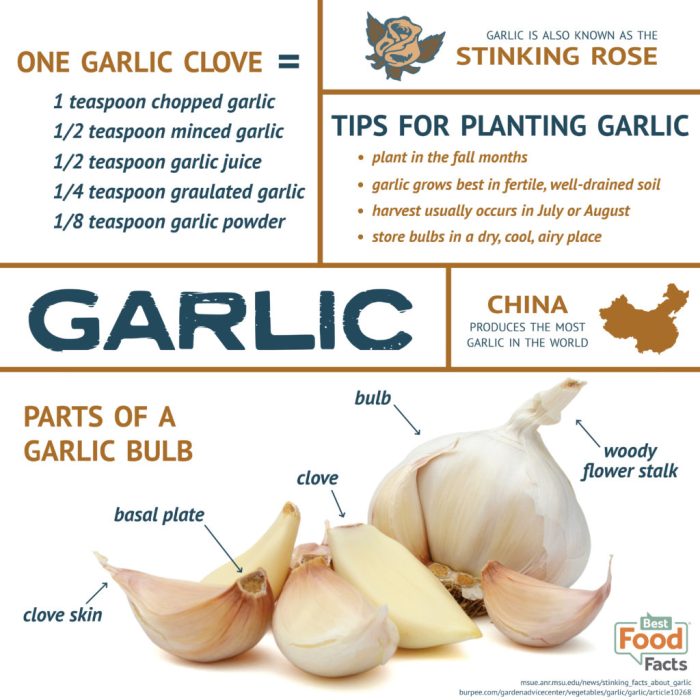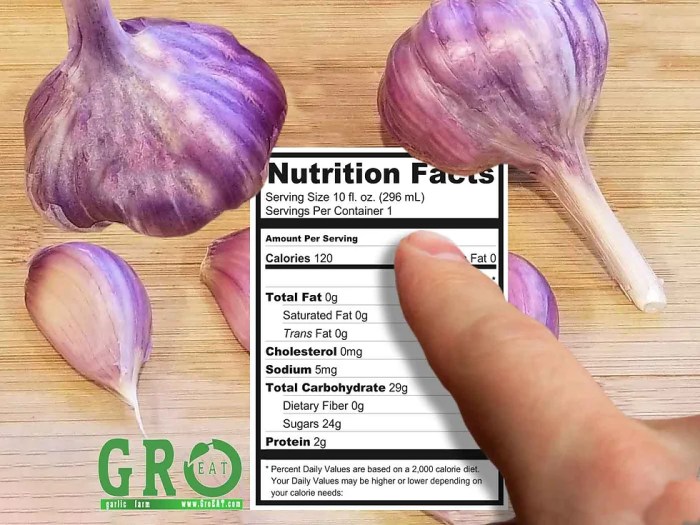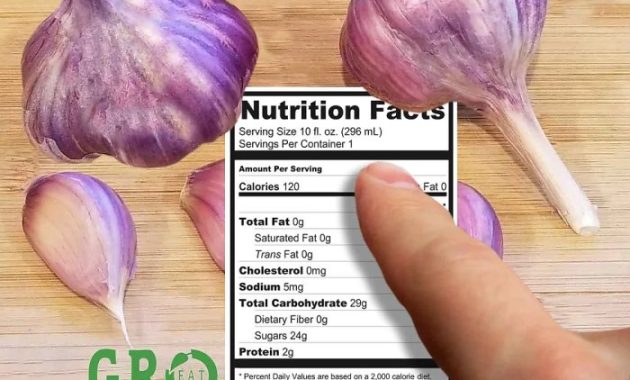Garlic’s Impact on Various Health Conditions

Garlic clove nutrition facts – Garlic’s potential health benefits extend beyond its culinary uses, impacting various physiological processes and potentially influencing the risk of several health conditions. While research continues to unravel the complexities of garlic’s effects, a growing body of evidence suggests significant roles in cardiovascular health and cancer prevention, alongside impacts on digestion. However, it’s crucial to remember that these effects are often influenced by factors like dosage, individual response, and potential interactions with medications.
Garlic’s Effects on Cholesterol and Blood Pressure
Garlic’s impact on cholesterol and blood pressure is linked to its sulfur-containing compounds, particularly allicin. Studies suggest that garlic may help lower total cholesterol and LDL (“bad”) cholesterol levels, potentially by inhibiting cholesterol synthesis and enhancing its excretion. Similarly, some research indicates that garlic might contribute to lower blood pressure, possibly through its antioxidant and anti-inflammatory properties, and by influencing nitric oxide production, which helps relax blood vessels.
However, the magnitude of these effects varies across studies, and the results are not consistently significant. Larger, more rigorous studies are needed to confirm these observations conclusively. It is also important to note that while garlic may offer some cardiovascular benefits, it shouldn’t replace prescribed medications for cholesterol or hypertension.
Garlic’s Potential Role in Cancer Prevention, Garlic clove nutrition facts
Garlic’s potential to prevent certain cancers is an area of ongoing research, with several proposed mechanisms of action. These mechanisms are complex and interconnected, but generally involve the compound allicin and other organosulfur compounds within garlic. These compounds have demonstrated antioxidant and anti-inflammatory properties, which may help protect cells from damage caused by free radicals, a contributing factor in cancer development.
Furthermore, some studies suggest that garlic may influence cell growth and apoptosis (programmed cell death), potentially hindering the development and spread of cancerous cells.
| Cancer Type | Mechanism of Action | Evidence Level | Additional Notes |
|---|---|---|---|
| Stomach Cancer | Inhibition of cell growth, antioxidant effects | Observational studies showing correlations, some promising preclinical data | More research is needed to establish a direct causal link. |
| Colon Cancer | Antioxidant and anti-inflammatory effects, modulation of gut microbiota | Some promising preclinical and observational studies, but human clinical trials are needed | Potential interaction with existing medications should be considered. |
| Prostate Cancer | Inhibition of cell proliferation, induction of apoptosis | Preclinical studies show promise, but human clinical trials are limited and require further investigation. | Results are inconsistent across different studies. |
| Lung Cancer | Antioxidant and anti-inflammatory effects, potential detoxification of carcinogens | Limited evidence, mostly from preclinical studies. More research is needed in human populations. | Requires further investigation to determine efficacy and safety in human subjects. |
Garlic and Medication Interactions
Garlic can interact with certain medications, particularly those affecting blood clotting. For instance, individuals taking anticoagulants (blood thinners) like warfarin should exercise caution when consuming large amounts of garlic, as it may increase the risk of bleeding. Garlic can also interact with antiplatelet drugs, such as aspirin, which also affect blood clotting. Furthermore, garlic may interact with HIV medications, affecting their metabolism and efficacy.
Always consult with a healthcare professional before significantly increasing your garlic intake, especially if you are taking any medications.
Garlic’s Effects on Digestive Health
Garlic can offer some benefits for digestive health, but also potential drawbacks. Some studies suggest that garlic may have antimicrobial properties, potentially helping to combat certain gut infections. It also contains prebiotics, which may promote the growth of beneficial gut bacteria. However, large quantities of garlic can cause digestive upset, including heartburn, gas, and diarrhea in some individuals.
Therefore, moderation is key when incorporating garlic into your diet for digestive health.
Garlic cloves, packed with allicin and antioxidants, are nutritional powerhouses. Their benefits extend even to dishes like egg drop soup; check out the egg drop soup nutrition facts to see how this simple soup contributes to a balanced diet. Adding a few minced garlic cloves to your soup significantly boosts its nutritional profile, making it an even healthier meal.
Methods of Including Garlic in the Diet

Garlic’s pungent flavor and impressive nutritional profile make it a versatile ingredient that can easily be incorporated into a wide variety of dishes. From savory main courses to flavorful sauces and even sweet treats (though less common!), there are numerous ways to enjoy the benefits of this powerful bulb. This section explores some delicious and nutritious ways to include garlic in your daily diet.
Garlic-Infused Recipes
Adding garlic to your meals is a simple way to boost their nutritional value and enhance their flavor. Below are three recipes showcasing garlic’s versatility.
Roasted Garlic and Herb Chicken
Ingredients: 1 whole chicken (about 3-4 lbs), 1 head of garlic, 2 tbsp olive oil, 1 tbsp dried rosemary, 1 tbsp dried thyme, salt and pepper to taste. Instructions: Preheat oven to 400°F (200°C). Cut the top off the garlic head to expose the cloves. Drizzle with olive oil and wrap in foil. Roast alongside the chicken for 45 minutes.
Remove garlic and mash. Combine with herbs, salt, and pepper. Rub mixture all over the chicken. Continue roasting until chicken is cooked through (about 1 hour). The roasted garlic adds a mellow sweetness and intensifies the flavor of the herbs, creating a flavorful and nutritious meal rich in protein and antioxidants.
Garlic Shrimp Scampi with Zucchini Noodles
Ingredients: 1 lb shrimp, peeled and deveined; 2 zucchini, spiralized; 4 cloves garlic, minced; 2 tbsp olive oil; 1/4 cup dry white wine; 2 tbsp lemon juice; 1/4 cup chopped parsley; salt and pepper to taste. Instructions: Heat olive oil in a large skillet over medium heat. Add garlic and cook until fragrant (about 30 seconds). Add shrimp and cook until pink and opaque (about 2-3 minutes per side).
Stir in white wine and lemon juice. Add zucchini noodles and cook until tender-crisp (about 2-3 minutes). Stir in parsley, salt, and pepper. This dish is low in carbohydrates, high in protein, and provides the cardiovascular benefits associated with garlic and shrimp.
Garlic and Potato Soup
Ingredients: 2 lbs potatoes, peeled and diced; 6 cloves garlic, minced; 4 cups vegetable broth; 1 cup milk or cream; 2 tbsp olive oil; salt and pepper to taste. Instructions: Heat olive oil in a large pot over medium heat. Add garlic and cook until fragrant (about 30 seconds). Add potatoes and vegetable broth. Bring to a boil, then reduce heat and simmer until potatoes are tender (about 15-20 minutes).
Puree soup using an immersion blender or in a regular blender. Stir in milk or cream, salt, and pepper. This creamy soup is a comforting and nutritious meal, providing essential vitamins and minerals from the potatoes and the immune-boosting properties of garlic.
Creative Uses for Garlic Cloves
Beyond standard cooking methods, garlic can be used in innovative and flavorful ways to enhance your food and your health.Garlic offers a variety of culinary possibilities beyond typical cooking methods. Here are five creative ways to use it:
- Garlic-Infused Olive Oil: Infuse olive oil with roasted garlic cloves for a flavorful and aromatic oil perfect for drizzling over salads, pasta, or bread.
- Garlic Pickles: Fermenting garlic cloves creates tangy and flavorful pickles that can be enjoyed as a snack or condiment.
- Garlic Powder: Dehydrate and grind garlic cloves into a powder for a convenient way to add garlic flavor to dishes.
- Garlic Confit: Slow-cooking garlic cloves in oil creates a sweet and spreadable garlic confit, ideal for adding to sandwiches or as a topping for meats.
- Garlic-Infused Honey: Combine roasted garlic cloves with honey for a unique sweet and savory spread that complements cheeses and meats.
Garlic Clove Structure and Components
A garlic clove is a single segment within a garlic bulb. The clove is encased in a papery skin, which protects the inner flesh. The flesh itself is composed of numerous cells containing alliin, an odorless compound. When the clove is crushed or chopped, the enzyme alliinase is released, converting alliin into allicin, the active compound responsible for garlic’s characteristic pungent odor and many of its health benefits.
The clove also contains various other nutrients, including vitamins, minerals, and antioxidants. The central part of the clove might show a small sprout, indicating the potential for the clove to grow into a new garlic plant.
Proper Storage of Garlic Cloves
Storing garlic correctly is crucial for maintaining its nutritional value and flavor. The ideal storage environment is cool, dark, and dry. Avoid storing garlic in the refrigerator, as this can accelerate the sprouting process and diminish its flavor. A dark pantry or cupboard is usually sufficient. For longer storage, braiding garlic bulbs or storing them in a mesh bag in a cool, dry place can help extend their shelf life.
Avoid storing garlic near strong-smelling foods, as it can absorb odors.
Helpful Answers: Garlic Clove Nutrition Facts
Can garlic lower blood pressure too much?
While garlic can contribute to lower blood pressure, excessive consumption might lead to it dropping too low, especially for individuals already on blood pressure medication. Consult your doctor before significantly increasing your garlic intake.
Is garlic safe during pregnancy?
Moderate garlic consumption is generally considered safe during pregnancy, but excessive intake might cause digestive upset. It’s advisable to consult with a healthcare professional.
Can garlic interact with blood thinners?
Yes, garlic’s blood-thinning properties can interact negatively with anticoagulant medications. Consult your doctor before consuming significant amounts of garlic if you are on blood thinners.
Does garlic have any potential benefits for skin health?
Some anecdotal evidence suggests garlic may have antibacterial and anti-inflammatory properties that could benefit skin conditions, but more robust research is needed.

